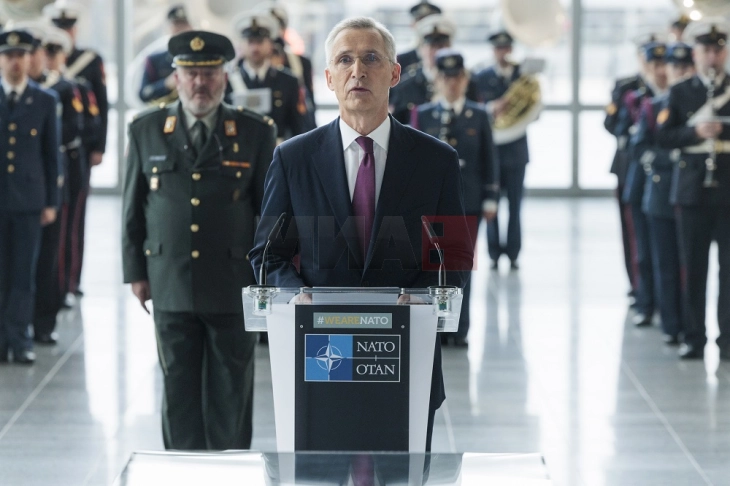Russia threat highlights NATO's purpose on 75th anniversary
- NATO marked the 75th anniversary of its founding with a ceremony in Brussels on Thursday amid a heightened Russian threat and lingering questions over the alliance's future.

Brussels, 4 April 2024 (dpa/MIA) - NATO marked the 75th anniversary of its founding with a ceremony in Brussels on Thursday amid a heightened Russian threat and lingering questions over the alliance's future.
After laying a wreath in memory of military personnel of NATO countries killed in service, the alliance's Secretary General Jens Stoltenberg said the United States and Europe need one another for their own security.
"Europe needs America for its security," Stoltenberg said. "At the same time, North America also needs Europe. European allies provide world-class militaries, vast intelligence networks, and unique diplomatic leverage, multiplying America's might."
Stoltenberg's remarks come at a time of waning US congressional support for continued military aid to Ukraine. Kiev is relying on NATO countries to provide the weapons and ammunition it needs to resist Russia's invasion of its territory.
Acknowledging long-standing US concerns that European allies aren't contributing enough to collective defence, Stoltenberg said: "Fair burden sharing is essential, and Europe is investing more, much more. This year, the majority of NATO allies will invest at least 2% of their GDP [Gross Domestic Product] in defence."
"Through NATO, the United States has more friends and more allies than any other major power. I don't believe in America alone, just as I don't believe in Europe alone," he added.
The ceremony also marked the approximate anniversaries of the accessions of several Central and Eastern European NATO member states.
"We tried to embrace Russia, but we knew that the potential for violence was there. Unfortunately, Russia is on the march again," Radosław Sikorski, foreign minister of Poland - which joined the alliance in March 1999 - said in a speech at NATO headquarters, referring to the period after the Cold War ended.
Sikorski added: "But happily, we are where we belong in the company of democracies among friends at home, resisting again like a rock."
Ukrainian Foreign Minister Dmytro Kuleba was also present on Thursday, to ask for more support - particularly Patriot surface-to-air missiles.
"I don't want to spoil the party," Dmytro Kuleba said after congratulating NATO members on the alliance's 75th anniversary. "But my main message today will be Patriots."
"Saving Ukrainian lives, saving the Ukrainian economy, saving Ukrainian cities, depends on the availability of Patriots and other air defence systems in Ukraine. We're talking about Patriots because it's the only system that can intercept ballistic missiles."
Top EU diplomat Josep Borrell and representatives from NATO's Pacific partners Australia, Japan, South Korea and New Zealand are also set to join the NATO talks on the Ukraine war and relations with Russia.
Founded by the United States and 11 other countries at the onset of the Cold War to deter the expansion of the communist Soviet Union, NATO has grown to 32 members with Sweden and Finland's recent entry.
The alliance is a collective security pact in which, according to Article 5 of the NATO founding treaty, an attack on one member of the alliance "shall be considered an attack against them all."
Article 5 has been invoked once, after the terrorist attacks of September 11, 2001, killed nearly 3,000 people in the United States.
When NATO was formed in 1949, it had a clear foe in the Soviet Union. But the dissolution of the Soviet bloc in 1991 prompted questions about the alliance's purpose with no threat left to deter.
The full-scale Russian invasion of Ukraine has breathed new life into the alliance with NATO allies in Eastern Europe fearing new Russian aggression.
The Western military alliance has also played a key role in rallying support for Ukraine against the Russian invasion but looming in the background is former US president Donald Trump's potential return to the White House after November's presidential election.
Sceptical of Western support for Ukraine, Trump openly questions NATO's collective defence obligations and rails against countries that do not meet the alliance's defence spending targets of 2% of GDP.
While defence spending from NATO allies has spiked during the Ukraine war, with 18 allies including Germany set to invest 2% of GDP on defence in 2024, the US still makes up the bulk of alliance defence spending.







